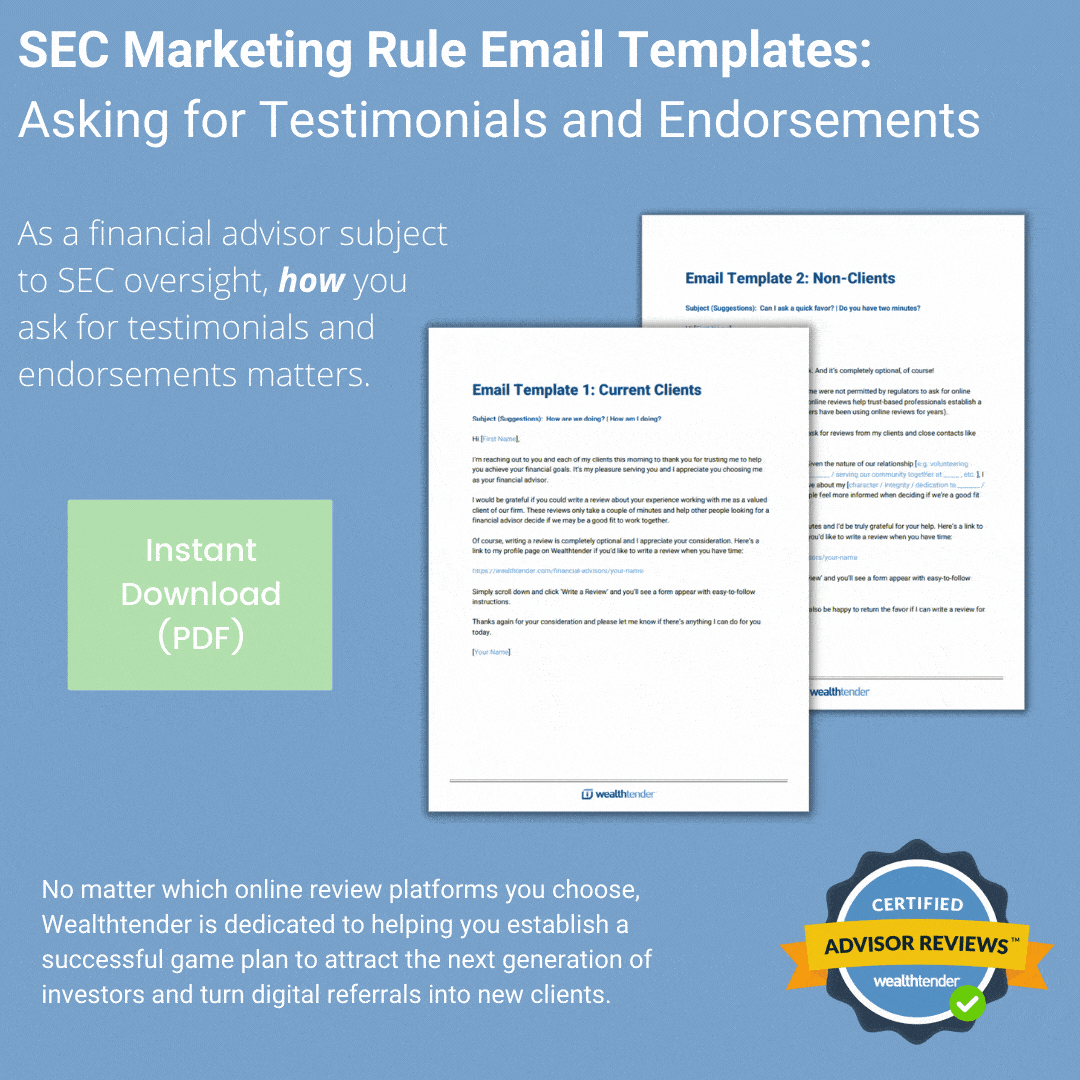
As a financial advisor subject to SEC oversight, how you ask for testimonials and endorsements matters.
In this article, we’ll explain how you can solicit reviews from your clients (testimonials) and non-clients (endorsements) for compliance with the SEC Marketing Rule [Rule 206(4)-1].
⭐ At the end of this article, you’ll find an email template you can use and further customize to ask for testimonials from your clients (along with a separate email template to ask for endorsements from non-clients). You’ll see the templates are intentionally brief to quickly get straight to the point.
Before you ask for your first review, it’s important to first ensure you’ve established your policies and procedures for testimonials and endorsements. Once this important step is completed and your firm has achieved compliance with the SEC Marketing Rule, you’re ready to begin asking for reviews on the review platform(s) you’ve chosen.
Learn the Risks of Review Platforms like Google and Yelp
Why We Include Comparisons to Google and Yelp
If Google and Yelp are not compatible with the SEC Marketing Rule, you may rightly be wondering why we’re discussing these platforms at all.
Here’s What We Know with Certainty:
Google and Yelp are well-known review platforms popular with consumers. And financial advisors may already have unsolicited reviews written about them visible on these sites. If these are favorable reviews and are truly unsolicited, that’s terrific as advisors are gaining SEO benefits and visibility among consumers visiting these sites.
But because reviews on Google and Yelp lack the required SEC disclosures to be considered advertisements (e.g. testimonials and endorsements you can promote to grow your business), advisors can’t direct prospects to check out their reviews on these platforms.
Here’s What We Don’t (Yet) Know:
Unlike unsolicited reviews published on Google or Yelp, the SEC has not formally offered guidance to clarify if solicited reviews on Google and Yelp are deemed an advertisement and, therefore, subject to the prohibitions and disclosure requirements discussed throughout the SEC Marketing Rule. So the question we need the SEC to answer is: Does the act of a financial advisor simply asking for a review to be written on specific platforms like Google or Yelp entangle an advisor in its creation and trigger the prohibitions and disclosure requirements?
While industry opinions are mixed on the guidance the SEC will ultimately provide, we believe it’s highly likely the SEC will take issue with advisors proactively soliciting reviews on platforms known to be incompatible with the Marketing rule. With its principles-based rule intended to ensure consumers gain important information to make more informed decisions, we don’t expect the SEC to look favorably upon a rampant proliferation of advisor reviews on platforms incapable of addressing the Marketing rule’s prohibitions and disclosure expectations.
Further, we believe the SEC could point to FINRA Regulatory Notice 17-18 which addresses this topic covering testimonials of registered representatives. In the notice, FINRA states: “FINRA does not regard unsolicited third-party opinions or comments posted on a social network to be communications of the broker-dealer or the representative for purposes of Rule 2210, including the requirements related to testimonials in paragraph (d)(6).”
Wealthtender has submitted written requests for clarification on this matter to the SEC (likely along with many other industry participants), and we monitor the SEC’s Marketing rule FAQ page daily. We’ll update our Guide to Growing Your Advisory Business Playbook as additional SEC guidance becomes known.
Since online reviews are new to our industry, we’re dividing this article into three important parts.
First, we’ll start by suggesting a practice exercise to conduct before you ask for your first review. Then we’ll discuss best practices when asking for your first reviews from clients and non-clients, followed by ideas to help you incorporate the process of asking for reviews into your everyday business.
1. Conducting a Testimonial Dress Rehearsal
Before asking for your first real reviews, consider the benefits of a dress rehearsal. We suggest putting yourself or a member of your team in the shoes of 2 to 3 clients and one non-client and writing mock reviews you can then evaluate using your new policies and procedures.
This is a great way to prepare yourself for actual reviews. Take the time to determine if your mock reviews trigger any SEC prohibitions to gain experience handling such scenarios. Next, craft clear and prominent and additional disclosures to accompany the mock reviews.
Use these disclosures to begin building a disclosure library in an easily accessible document. While many reviews you receive will require unique disclosures based on individual circumstances, your disclosure library can improve consistency in your disclosures where appropriate or serve as a helpful starting point for disclosures requiring customization.

Learn how United Financial Planning Group grows its business with a testimonial marketing strategy powered by Wealthtender.
2. It’s Showtime! Asking for Your First Testimonials
The SEC wants to ensure you’re not cherry-picking reviews from your favorite clients, so it’s important to ask all of your current clients for a review when first getting started. While we’ll discuss multiple methods of asking for reviews in your everyday business, we suggest using email at the outset as an effective way to maintain records of your outreach and demonstrate to the SEC you’re not cherry-picking favorites, if requested.
Consider these tips when drafting your email and preparing to ask for reviews:
- Avoid asking for a positive review or inserting language which appears to influence a reviewer toward responding in a particular way
- Prepare a single email you’ll send to all clients – This will demonstrate to the SEC that your messaging is consistent regardless of the nature of your relationship
- Schedule the email for early morning delivery on a weekday (e.g., 5 am) or consider weekend delivery to avoid overlapping with time-sensitive client emails
- Consider reaching out to sensitive clients by phone the afternoon prior to your outreach to provide context about the email they’ll receive the next day
- Consider reaching out to brand new clients by phone in advance who might feel the email asking for a review is premature; Offer context about the SEC rule
- Are there non-clients you want to ask for a review at this time? Refer to the email template for non-clients in the playbook appendix as a starting point
After your initial emails have been sent, don’t worry if you don’t immediately receive reviews. You’ve checked the first box to comply with SEC requirements, and future opportunities to ask for reviews will be ample and feel more natural.

“Wealthtender is one of the best decisions we have made as a firm. I wish we had done it sooner.”
Gerry Barrasso
President & Founder
United Financial Planning Group
3. Asking for Online Reviews in Your Everyday Business
Just as other trust-based professionals like doctors and lawyers have incorporated online reviews into their daily routines, you’re now ready to do the same. Importantly, you’ll still need to avoid SEC cherry-picking concerns, so your online review policies and procedures should be updated to show how your ongoing approach for review collection is consistently applied across all clients.
Consider these methods and tips for collecting reviews in your daily routine:
- Update your email signature to include a link to your profile page on an online review platform or your website where clients can write a review
- Add a new section to your client newsletter that includes a link to write a review on your profile page of an online review platform and/or your own website
- Create a flyer with instructions on how someone can write a review for you and make it accessible to clients visiting your office; If you’re on Wealthtender, include the QR code we create that links to your Wealthtender profile page
- Create an area on your website where clients can write a review and read your existing reviews; If you’re on Wealthtender, consider embedding our widget on your website to both collect and display reviews
- Create a version of your business card with a QR code linking to your profile page to periodically share with non-clients; Use it to ask for a review at the right moment
- If you offer one-time planning or project-based services, incorporate a request for a review into your workflow at the conclusion of each project
- If you ask for reviews on general online review sites, don’t encourage clients to write a review while they’re in your office as these platforms could suspect multiple reviews from your own IP address as being fraudulent
- If you plan to offer compensation in exchange for a review, consider proposing a charitable donation in the name of the reviewer; This shows your appreciation for the reviewer’s time, lessens the perception of influence, and will reflect favorably in the compensation disclosure accompanying the published review.
Promote Your Reviews With Testimonial Marketing Studio™
Harness the full potential of your online reviews to compliantly convert more prospects into clients.
✔️ Access a growing library of professionally designed video and image templates
✔️ Import your online reviews from Wealthtender into Studio projects with just two clicks
✔️ Create scroll-stopping social media content and impactful resources for marketing campaigns in < 2 minutes
✔️ Preview and regenerate projects to optimize their design and ensure disclosures satisfy compliance requirements
↗️ Take a Tour and Learn More About Testimonial Marketing Studio
Getting Started with Testimonials and Endorsements
We hope you found this article helpful, and we encourage you to read each of the articles in our SEC Marketing Rule Education Series for more ideas to compliantly attract new clients and grow your business with testimonials and endorsements.
Financial advisors embracing online reviews will lead the industry in attracting new clients throughout the historic transfer of wealth from Baby Boomers to Millennials over the next decade.
Online reviews establish a human connection with prospects, demonstrating your trustworthiness and increasing their confidence in contacting and hiring you. But online reviews are just one important part of an effective marketing plan to strengthen your online reputation and attract new clients in today’s world.
At Wealthtender, we’re dedicated to helping you grow your business with our Modern Advisor Marketing™ platform that provides the knowledge and reassurance your future clients are looking for online to hire you with confidence and conviction.
Beyond our industry-first Certified Advisor Reviews™ designed for compliance with the SEC Marketing rule, financial advisors and wealth management firms that join Wealthtender gain recognition for their areas of specialization and SEO benefits to rank higher in Google search results.
Whether you choose to join our growing community of financial advisors and advisory firms on Wealthtender or prefer to grow on your own, we hope these articles help you achieve exceptional results with your online reviews for years to come.
If you have questions, feedback, or would like to discuss the SEC Marketing rule with us, please email yourfriends@wealthtender.com or call Wealthtender Founder and CEO Brian Thorp directly at (512) 856-5406.

About the Author

About the Author
Brian Thorp
Brian is CEO and founder of Wealthtender and Editor-in-Chief. He and his wife live in Austin, Texas. With over 25 years in the financial services industry, Brian is applying his experience and passion at Wealthtender to help more people enjoy life with less money stress. Learn More about Brian
Book a Wealthtender Demo
Select a day in the calendar below to schedule a meeting
with Brian Thorp, Wealthtender founder and CEO.








